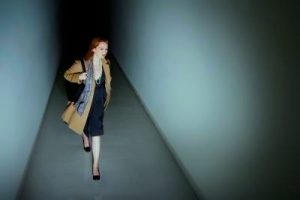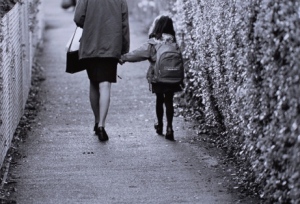
She’s always prepared to hate New York City. It’s such a loud, impatient place, and everyone’s always honking their horn, willfully cultivating an age-old cliché. The cars here have their own language, a street smart, uninhibited idiom that vehicle counterparts in other cities never learned. Taxi drivers pump their gas pedals at red lights, the modern day equivalent of rev’ing an engine, inching forward as if it somehow gives them an edge, satisfying a need for perpetual motion. In the cab she picks up at JFK, a TV screen comes on automatically in the backseat, CNN competing with the view of Queens flying by.
There’s so much to dislike. People throw their garbage onto the curb in this city. Right there on the sidewalk, where you have to smell it and step around it. C’mon, that’s gross. Really? It would be one thing if the sidewalks were deserted and no one had to look at it, but the reality is that the sidewalks vibrate with constant foot traffic, busy people talking animatedly on their cell phones, stepping carefully around the plastic bags of refuse in their expensive (or inexpensively fashionable) shoes. Crowds of people get jostled at street corners, vying for a front position so that they, like the cabs, can sustain a forward motion. They don’t even wait for the light to turn green. She’s always surprised one of those fast moving, honking taxis doesn’t slam into some oblivious New Yorker or tourist who goes walking calmly out into the street against the red light, right in front of her. But it hasn’t happened yet.
Everything is so jam packed together. That the sun finds its way around those tall buildings and onto any given street is kind of amazing. All those weary, dirty, graffiti-clad buildings with rusty stairs on the outside, like worn bones on the wrong side of skin. They seem completely disinterested in the sun and its daily arc. Even the newer, sleeker, glass buildings designed to celebrate the light end up reflecting it back to the sky, not so much down to the sidewalks.
Maybe its just disorientation. The way Manhattan seems to reject it’s natural surroundings always throws her at first. Unlike the city she calls home, the buildings here seem to turn their backs on the organic channel around them, keeping the population inwardly-oriented. As the city swallows you, it can be hard to believe there are real tidal straits just blocks away, with currents strong enough to carry a swimmer out into the Atlantic Ocean. Only the ferries and bridges, with their unarguable contributions of motion and architecture, are given a grudging nod for their value, accessories to the larger ensemble. The straits are shockingly polluted, but they continue to offer transportation, commerce, recreation, and visual relief to the city, resigned to their fate, perhaps as she is. Maybe she feels snubbed at first too, as NYC doesn’t so much welcome you as it deigns to grant you access.
[heart]
Despite all this, New York City always manages to settle under her suburban West Coast skin. Within the first 24 hours, noises start to blend into the background, becoming almost musical, communicating useful information, like the time of day, streets she should visit, and events worthy of further exploration.
One of her taxi drivers is originally from India. He has lived here for 18 years and once lived in her hometown, and he is excited when she admits where she is from. She has to lean forward to understand him well, but this just proves to him that she is interested. Instantly, they are friends and he knows that she has two children and a husband who owns his own business, and that her mom was a social worker and her dad worked for the telephone company. He is momentarily distressed that they divorced when she was young, although she tries to get him to see that this was a good thing. He mutters and shakes his head, in a hell-in-a-handbasket kind of way, lamenting the divorce rate in America. Even if she doesn’t share his perspective, it’s nice to know his traditions are alive and well. (It also amuses her that he keeps checking his reflection in the rearview mirror, as if validating his wisdom, and maybe his good looks.)
Once she’s adjusted to the city, her senses are bombarded in a good way. Thousands of smells are embedded in a street that is never still long enough to be washed. Her attention, at first drawn to the stains on the sidewalk that might be bodily emissions, quickly turns to fascination with the superbly fashionable but understated French women walking in front of her, talking in their sensual, fluid language. Their voices are beautiful, and their conversation includes the English names of restaurants, galleries, and other recognizable points of interest.
Men unload an unidentifiable shipment into a warehouse next door to her hotel, maneuvering around the ferns and other floral trimmings poking out of plastic garbage bags at the curb. A perfect dahlia the color of a city sunset lies where it fell on the sidewalk, and she hesitates, wanting to pick it up. A flower shop owner is momentarily curious, pouring water out of pots and surveying the patch of sidewalk he’s just swept. A subway rushes past under her feet, the sound rumbling up from the vents at the curb. Already, she feels alive in a way she is not at home. She notices that though she is the only American white person in the vicinity, she does not stick out like a sore thumb. It’s as if here race is less important than the vibrancy of your skin, and how well you wear it.
She stands at the 9/11 memorial, and it touches her the way it is meant to. Gaping holes in the ground that are perpetually weeping, sucking tears down into a channel she cannot see into or follow. The significance couldn’t possibly be lost on anyone, anymore than the names that are grouped by proximity and relationship, rather than alphabetically, and engraved on a ledge she can trace slowly with her fingers.
Counter to initial impressions, nature is alive and well here, asserting itself in surprising places. She walks in Central Park on a Saturday, when the greens and pathways are filled with people, graceful elms, and sky, all adapting to autumn. She finds it in park-like ambiance along the High Line, and in the one-acre Battery Urban Farm in the financial district. She marvels at the clouds above the Manhattan skyline from the Staten Island ferry and feels a kinship with not only her fellow riders, but the aspirations of the people who make up the businesses that build those towering buildings that almost reach them. The Statue of Liberty is amused by her awakening, a re-enactment that would seemingly get old when you’re planted on an island in the middle of a harbor. The city’s architecture and art are as enchanting from the water as they are from the interior streets, as is the wind on her face and yes, the sunlight on her skin.
Within the first 24 hours, she realizes she is in love with New York City again.
photo credit: ek2014
 This work is licensed under a Creative Commons Attribution-NonCommercial-NoDerivs 3.0 Unported License.
This work is licensed under a Creative Commons Attribution-NonCommercial-NoDerivs 3.0 Unported License.
 This work is licensed under a Creative Commons Attribution-NonCommercial-NoDerivs 3.0 Unported License.
This work is licensed under a Creative Commons Attribution-NonCommercial-NoDerivs 3.0 Unported License.









